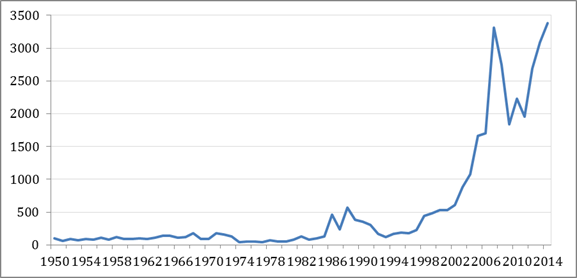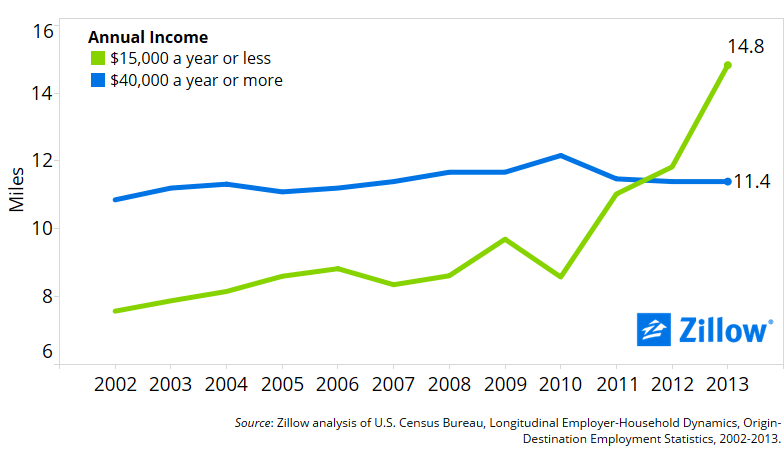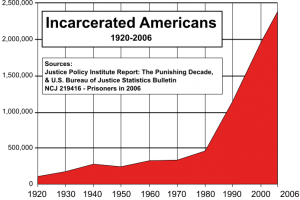As early as 1999, while I cold-called my way into a meager existence my first few years at Morgan Stanley, it was obvious 401(k) plans were going to be worthless for workers and an eventual money grab for Wall Street, if not already. I don’t claim any special prescience. I’m just a guy educated at a state school in Houston, born in the Texas Hill Country, and a bit of a world traveler. But my bullshit detector is world class.
That said, we Americans want everything on the cheap. Down here in Texas, we say cheapskates are “penny wise, but pound stupid.”
Said cheapness, plus an unfortunate tendency to conflate gambling and investing, which blossomed during the Reagan and Clinton eras, has created an American system of finance that is galactic in its boundless stupidity–stupidity that is only matched by how far its influence reaches into the nether regions of our government. Aside from the riveting debates between Byron Wien and Barton Biggs, what little non-sales time I had I spent researching the ins and outs of Wall Street. The first big scheme of bovine excretions I investigated were corporate sponsored 401(k)s with claims of cheap cost ratios and even greater returns. The price for both assumptions were out-sized in 2001, but on the day the last Boomer passes will end up in the trillions.
(I am fundraising to determine how much I’ll write this year. If you value my writing, and want more of it, please consider donating.)
First, cost ratios on managed mutual funds, which form the majority of Wall Street retail mutual fund sales (they get a 5 percent commission) are roughly 2 percent yearly, with some as high as 5 percent. Cost ratios on market-linked annuities (index funds wrapped in insurance blankets seeking market-like returns) can be double that. Just another in a long line of reasons to reinstate Glass-Steagall. Anyone see a problem with insurance companies guaranteeing stock-like returns with insurance wrappers providing a guarantee?
Huh, say you? That sounds like something guaranteed to blow up in your face.
It was. It did. Had AIG failed, the market-backed annuities would have failed as well. Those annuities carrying a guaranteed rate of return, owned by a failing investment bank, er, insurance company were problematic. This is something Glass-Steagall was designed to prevent. Let us put to death the sad canard of the financially ignorant: but G-S is a 1930s law designed for 1930 problems! You now know better. Hopefully you have a rudimentary understanding of its practical applications as well. But I digress.
Compound those cost ratios, as discussed above (2 percent investment fees and costs), and you’ll find yourself with a pretty deep pool of money, one for which Wall Street has created a special beer-bong like contraption, so as to drink it all in one gulp. Like Taibbi’s Vampire Squid and your obnoxious brother-in-law, Bubba, drinking at the Super Bowl party from which you so desperately tried to keep them away. Free beer? Steal it! That’s what they do.
Now, consider how much they salivate (think English Bulldog, 90* F, and 96 percent relative humidity type salivation) over the looming privatization of municipal, county, and state pension plans? It’s that obscene. The pool of money is immense. The cost ratio for one Texas pension plan is as low as Social Security, which is .52 percent or 52 basis points, last I checked. Wall Street can get 2 percent, easily. You see how huge a difference that is? Now does it make sense why there is all this talk of undoing school teacher pension plans, city plans, county plans, state plans? All so Goldman, Morgan Stanley, and a few others can rape the middle class just that little bit more.
But what about stocks? Weren’t they great investments? Sure, if you were an old fuddy-duddy like Col. K., a client of mine at Morgan Stanley. Dude was richer than Croesus, but dressed like Grandpa Clampett. Every now and then, he’d come in and sell 1,000 shares of GE or Ford or Intel. He’d simply forgotten about them and when his bank account got low, he’d dig out a certificate and bring it to me to sell. One sale of Intel was half a million dollars. $500,000. His cost basis was $9.12 and he sold it at $74 3/16. So yeah, if you bought stock like that, the market works. But this is America and everyone wants a cheap buck. So they bought Dell at $25 and sold out at $50 three months later. Or Billing Concepts at $7 and sold at $20. The list goes on forever until we get to the bubble bursting, and then Intel bought at $75 was then sold at $33. Dell bought at $51 was sold at $16. Investing is like being Pete Rose when he’s not gambling: slow and steady when you’re at bat, collecting singles and doubles like they are pennies and dimes. Pretty soon, you’re the champ! Even then, there was fraud to be found in Blue Chip stocks, like GE.
We had a saying back in the day: As GE goes, so does America. Before Jack “the Hack” was made CEO, this was gospel. But once Jack “The Hack” discovered control fraud and accounting larceny at GE, it was only a matter of time. GE was a bellwether for the entire American economy (I cannot stress this enough), but not after Jack left. First, he sold every worthwhile asset the company ever created, and all the while he cheated. How? Well, each quarter, Welch stoked a penny per share from GE’s supposedly over-funded pension fund, and used it to beat the earnings and whisper estimates on the Street. This drove the entire Dow 309. Up, up, and away.
But then the party was over. Enron collapsed, and every bad practice on Wall Street was exposed. Generation X took the brunt of the losses: Almost half of the net worth Generation X had accumulated (46 percent) in the 15 years it had been working a real job (if they’d been lucky enough to avoid a McJob, aka: temp work, that is) was lost. Baby Boomers fared better because most of their wealth was still wrapped up in their homes. Wall Street found a way to steal that money, too.
Boomers saved, bet it all on their homes, and lost. That is reality. Spin it any way you like. Boomers lost at the Blackjack table. Period.
So we’re left with the results and consequences: “We have stagnant wages, whole industries crushed, and entire cities decimated by economic collapse. Yet somehow we were individually supposed to have been able to set aside $1.5 million for our retirement.
“Most people are retiring with less than $25,000 saved. For the next three decades, we will see an entire generation of Dolores Westfalls roaming our neighborhoods in a dire state of crisis.”
The first time I saw this particular story was in Russia, standing on the balcony of a big Khruschev era blockhouse with my soon-to-be-wife, both looking down at the trash area, watching a babushka (literally: grandmother, informally: old lady) rummaging through the garbage. “She’s here every day,” my wife-to-be said. A year later, we got the news she had died. She was 58. She looked 75.
“That could never happen to us,” I thought, true pity stirring in my heart for this old woman.
But then I remember something I saw in Moscow two years prior; something that has stirred in me a constant feeling of discomfort, and often dread.
Upon walking through красный площадь (Red Square) and admiring Собор Василия Блаженного (St. Basil’s Cathedral), I crossed the frozen Москва-река (Moscow River), on my way to Новоде́вичий монасты́рь (Novodevichy Convent) where Peter the Great imprisoned his sister, Sofia Alekseyevna, that she cease challenging his rule. Before me rose a gorgeous stainless column topped off with a Cosmonaut. Here was Yuri Gagarin, first human in space. Let that sink in for a moment: The first human in space.
Empires and great powers fall swiftly now. Modernity is a cruel Olympian god, exacting his tolls immediately and in full. The United States of America, no matter how much it believes it is immune to the rules of history, that it is “Exceptional” is simply a lie we tell ourselves at night like the little boy whistling past the graveyard.
Scenes of elderly poverty, grim and grinding, as bad as those from our Great Depression, will soon become a regular feature in the life of United States citizens.
And that’s only the best case scenario.









